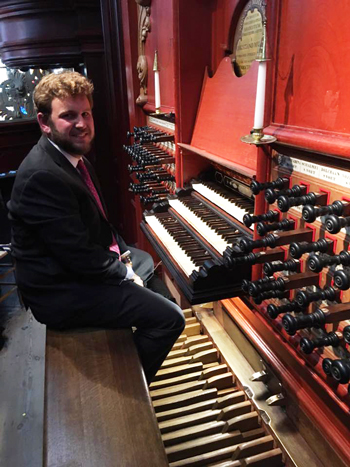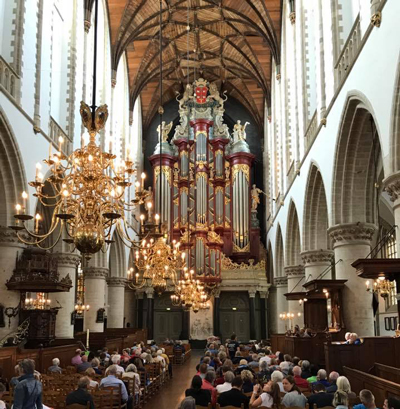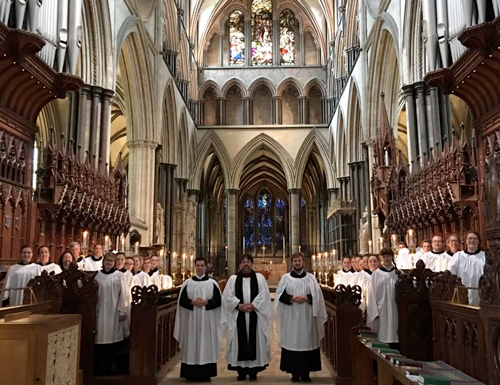by Daniel Hathaway

Kennedy’s eclectic program on the church’s American classic-style Schantz organ will include Georg Böhm’s Praeludium in C, J.S. Bach’s Concerto in d after Vivaldi, BWV 596, Jehan Alain’s Première and Deuxième Fantaisies, Gabriel Pierné’s Trois Pièces pour Grand Orgue à Pédales, Op. 29, Ethel Smyth’s Choralvorspiel und fuge über O Traurigkeit, o Herzeleid, and Maurice Duruflé’s “Toccata” (from the Suite, Op. 5).
As the winner of the Grand Prix de Chartres competition in 2014, Kennedy took away a €5,000 prize and an impressive list of future recitals, including performances in the Berliner Dom, the St. Petersburg Philharmonic Hall, England’s St. Alban’s Cathedral, and venues in Spain, Italy, Luxembourg, Iceland, and Slovakia. But only a few of his appearances last summer were on the list arranged by the competition. The rest he set up himself, using a network of personal and professional connections, he said by telephone from Grosse Pointe.
Unlike pianists, who can expect to encounter similar instruments wherever they go on tour, organists have to cope with wildly different organs that in Kennedy’s case last summer ran the gamut from meantone instruments in the Abbatiale de Bellelay (Switzerland) through the famous 1738 Müller organ in the St. Bavo church in Haarlem (Netherlands, photo below), to the 19th-century Cavaille-Cöll in Orleans Cathedral (France) and the 20th-century Metzler in Zürich’s Grossmünster (Switzerland).
Kennedy said he had “an amazing time” in Bellelay getting to know the two reconstructions by Kuhn Organ Builders of early 18th-century instruments by Joseph Bossard. “Apparently Kuhn were so intent on building an authentic replica that they first built replicas of Bossard’s tools, then they built the organs.”
Since the organ has experienced various waves of technological innovation over the course of its long history, playing aids that allow the performer to select and change stops during the course of a piece range from the noxexistent to the complex. “At the Bavo, you have no mechanical assistance, but there are human assistants who do a terrific job of pulling stops,” Kennedy said. In another case, three mechanisms that control the Venetian shades of a swell box were stacked closely together directly over the pedal clavier. “That made me very nervous,” he said.
In between his fifth and sixth solo recitals, Dexter Kennedy met up with the choir of Christ Church, Grosse Pointe, who sang all the normal choral services during one-week residencies at Westminster Abbey and Salisbury Cathedral. There his job was to accompany the singers during Choral Evensong and Sunday services.
“I didn’t think I’d get to play at all in London because the Abbey musicians are very particular about who gets to preside at the organ,” he said. “So it surprised me when I ended up playing for three services. I was given a three-hour practice slot late at night, and ended up using every bit of the time because you have to do so many strange things to make that organ work with the choir.”
Salisbury was more accommodating to visiting organists and also more suited to group interaction. “In London, everybody split up to go sightseeing, but in Salisbury we spent much more time together both in town and on side trips.”
Kennedy said that one of the highlights of the summer was when the Grosse Pointe Choir got together in London with members of the choirs of St. Phillip’s Cathedral, Atlanta, and Trinity Cathedral, Portland, Oregon — all of whom were across the pond singing residencies in different English cathedrals.
But there was another memorable summer moment just before Kennedy’s European tour got underway. In mid-June, he made his South American debut with a recital at the Bach en Bogotá Festival, part of a massive event that presented J.S. Bach’s complete organ works at the Catédral Primada in Colombia’s capital city. “They did extensive publicity, and an audience of 2,000 turned up for the recital,” Kennedy said. “You could sense the energy in the room, and midway through, just after the big pedal cadenza in the a-minor Fugue, there was such an ovation that I thought I wouldn’t be able to finish the rest of the program.”
Back home after such heady experiences, Kennedy is looking forward to another choir year in Grosse Pointe, to building up the organ studies program at the College of Wooster, and to filling in for his mentor James David Christie at Oberlin during a partial sabbatical. “It’s been a very productive and exciting summer, but I’m ready to return to the States.”
Published on ClevelandClassical.com September 5, 2017.
Click here for a printable copy of this article




